Related Research Articles

Exeter Cathedral, properly known as the Cathedral Church of Saint Peter in Exeter, is an Anglican cathedral, and the seat of the Bishop of Exeter, in the city of Exeter, Devon, in South West England. The present building was complete by about 1400, and has several notable features, including an early set of misericords, an astronomical clock and the longest uninterrupted vaulted ceiling in England.

Gervase Babington (1549/1550–1610) was an English churchman, serving as the Bishop of Llandaff (1591–1594), Bishop of Exeter (1594–1597) and Bishop of Worcester in 1597–1610. He was a member of the Babington family and held influential offices at the same time as his cousin Anthony Babington was executed for treason against Elizabeth I as part of the Babington Plot.
George Downame, otherwise known as George Downham, was an author of influential philosophical and religious works who served as Bishop of Derry during the early years of the Plantation of Ulster. He is said to have been a chaplain to both Elizabeth I and James I.
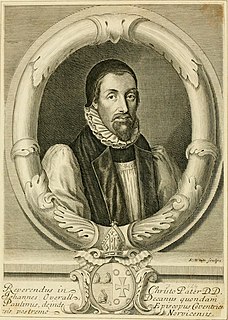
John Overall (1559–1619) was the 38th bishop of the see of Norwich from 1618 until his death one year later. He had previously served as Bishop of Coventry and Lichfield, as Dean of St Paul's Cathedral from 1601, as Master of Catharine Hall from 1598, and as Regius Professor of Divinity at Cambridge University from 1596. He also served on the Court of High Commission and as a Translator of the King James Version of the Bible.
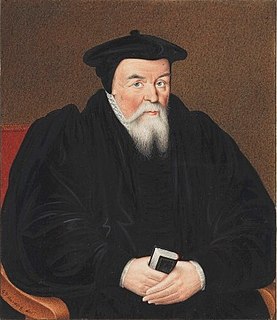
Gabriel Goodman became the Dean of Westminster on 23 September 1561 and the re-founder of Ruthin School, in Ruthin, Denbighshire. In 1568 he translated the “First Epistle to the Corinthians" for the “Bishops' Bible” and assisted Dr William Morgan with his translation of the Bible into Welsh. He is mentioned on the monument to William Morgan which stands in the grounds of St Asaph cathedral.
Archibald Douglas, Parson of Douglas, was also Parson of Glasgow, a Senator of the College of Justice, Ambassador to Queen Elizabeth I of England, and a notorious intriguer.
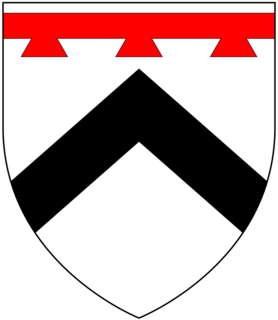
John Prideaux D.D. was an English academic and Bishop of Worcester.

Ofspring Blackall, Bishop of Exeter and religious controversialist, was born in London.
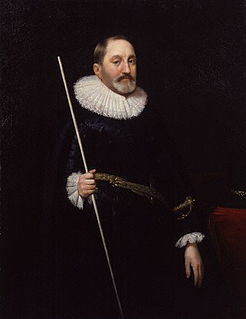
Sir Thomas Edmonds was an English diplomat and politician who served under three successive monarchs, Queen Elizabeth I, Kings James I and Charles I, and occupied the office of Treasurer of the Royal Household from 1618 to 1639.
Richard Curteys (c.1532?–1582) was an English churchman. A native of Lincolnshire, after his education at St. John's, Cambridge he was ordained and eventually became chaplain to Queen Elizabeth I. He was made dean of Chichester cathedral and then Bishop of Chichester. Curteys was reputedly a promoter of preaching and the clerical improvement of Anglicanism. In Curteys' episcopate, the cost of supporting many residentiaries and providing hospitality, could not be funded by the relatively small income of Chichester Cathedral. Curteys remodelled the constitution to reduce costs. Despite the changes Curteys died penniless.
Hugh Gray was an English churchman and academic, and the second Gresham Professor of Divinity.

Richard Edes (1555–1604) was an English churchman. He became Dean of Worcester, and was nominated one of the translators for the Authorised King James Version, in the Second Oxford Company, but died in the earliest stages of the project.
George Meriton was an English churchman, Dean of Peterborough in 1612 and Dean of York in 1617.
Nicholas Robinson was a Welsh bishop of Bangor.
Richard Cheyney was an English churchman, bishop of Gloucester from 1562. Opposed to Calvinism, he was an isolated and embattled bishop of the reign of Elizabeth, though able to keep his see.
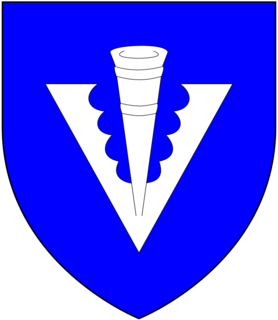
William Bradbridge (1501–1578) was an English bishop of Exeter.
John Woolton (1535?–1594) served as Bishop of Exeter in Devon, England, from 1579 to 1594.
John Garbrand or Herks (1542–1589) was an English cleric, a prebendary of Salisbury Cathedral and friend of Bishop Jewell.

Filippo Sega was a Catholic bishop from 1575 to 1596 and a cardinal from 1591 to 1596. He served as a papal diplomat in several important and sensitive posts, in Flanders, Spain, Vienna, Prague, and France.
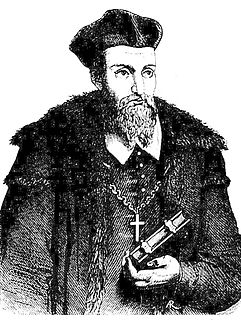
Marcin Białobrzeski (1530–1586) was a 16th-century Polish bishop, bibliophile, author, theologian, and preacher. Białobrzeski was born in 1530 in Białobrzegi into the Abdank Noble Family. He took religious vows in the Cistercian Monastery of Sulejów and was educated at the expense of the monastery in the Krakow Academy of Literature.
References
-
 This article incorporates text from a publication now in the public domain : "Chardon, John". Dictionary of National Biography . London: Smith, Elder & Co. 1885–1900.
This article incorporates text from a publication now in the public domain : "Chardon, John". Dictionary of National Biography . London: Smith, Elder & Co. 1885–1900.